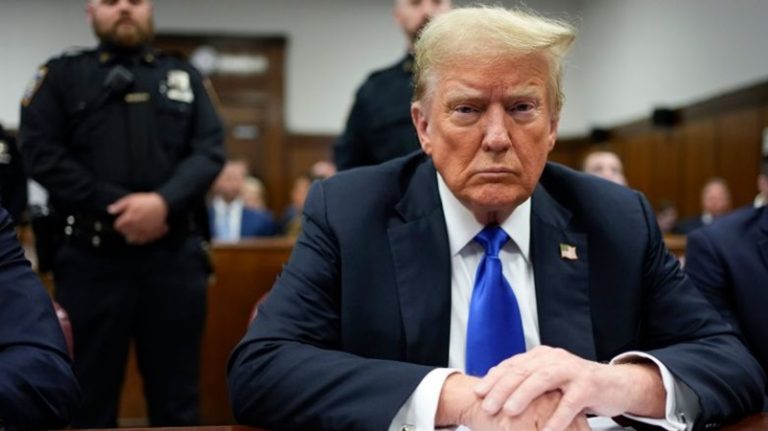
Former U.S. President Donald Trump, who is once again seeking the White House, recently stirred controversy with his remarks about Taiwan. Trump suggested that Taiwan should pay the U.S. for its defense, comparing the country to an insurance policy that offers no returns.
“Taiwan should pay us for defense,” Trump said.
“You know, we’re no different than an insurance company. Taiwan doesn’t give us anything.”
Register for Tekedia Mini-MBA edition 19 (Feb 9 – May 2, 2026): big discounts for early bird.
Tekedia AI in Business Masterclass opens registrations.
Join Tekedia Capital Syndicate and co-invest in great global startups.
Register for Tekedia AI Lab: From Technical Design to Deployment (next edition begins Jan 24 2026).
He added, “They took almost 100% of our chip industry, I give them credit. We should have never let that happen.”
These comments, made during an interview with Bloomberg Businessweek, reflect a broader discourse on the geopolitical and economic intricacies surrounding Taiwan, particularly its pivotal role in the global semiconductor industry.
Taiwan holds a unique and critical position in the global semiconductor industry. The island is home to Taiwan Semiconductor Manufacturing Co. (TSMC), the world’s largest and most advanced chipmaker. TSMC produces cutting-edge semiconductors for major American technology companies like Apple and Nvidia, making Taiwan indispensable to the tech sector.
According to TrendForce data, Taiwan is projected to account for 66% of the world’s production of advanced chips in 2024, while the U.S. is expected to contribute just 6%.
The concentration of semiconductor manufacturing in Taiwan has raised significant concerns about the potential risks associated with geopolitical tensions, especially given China’s stance on Taiwan. Beijing considers Taiwan a part of its territory, and Chinese President Xi Jinping has asserted that reunification with the mainland is inevitable.
In the event of a Chinese attack on Taiwan, the ramifications for global technology supply chains could be catastrophic. TSMC Chairman Mark Liu has warned that any military action would render TSMC’s factories inoperable, disrupting the global supply of advanced semiconductors.
Trump’s suggestion that Taiwan should pay the U.S. for defense highlights his transactional approach to international relations. In the past, Trump’s Make America Great Again (MAGA) mantra was buoyed by his idea of curtailing the cost of US global leadership.
Thus, by likening the U.S. defense commitment to an insurance policy, Trump emphasizes his belief that allies should contribute more financially to their security arrangements.
“Now we’re giving them billions of dollars to build new chips in our country, and then they’re going to take that too, in other words, they’ll build it but then they’ll bring it back to their country,” he said.
This perspective is consistent with his broader views on global defense spending, where he has often criticized allies for not bearing a fair share of defense costs.
However, Trump’s comments contrast the broader context of U.S.-Taiwan relations and the geopolitical stakes involved. Taiwan’s semiconductor industry is not only vital to the global economy but also strategically important to U.S. technological leadership. The reliance on Taiwanese semiconductors means that maintaining stability in the region is in the U.S.’s direct interest, beyond any financial considerations.
This means withdrawing support for Taiwan, especially in the face of the ongoing chip and geopolitical warfare with China, would be a strategic misstep. The semiconductor industry is crucial for national security, given its applications in everything from consumer electronics to military technology. Thus, analysts believe that ensuring the stability and security of Taiwan is integral to maintaining the U.S.’s technological edge and economic security.
The Biden administration has recognized these risks and has taken steps to reduce the U.S.’s dependence on Taiwanese chip manufacturing. Through initiatives like the CHIPS and Science Act, the U.S. government has allocated significant grants to encourage semiconductor companies to establish and expand their manufacturing facilities within the United States. These efforts aim to build a more resilient and self-sufficient domestic semiconductor industry.
Political Motive Behind Trump’s Comments?
Trump’s current stance on Taiwan is believed to be based on political calculations. Many believe that by advocating for Taiwan to pay for defense, Trump appeals to a segment of his base that favors reduced U.S. spending abroad and increased financial contributions from allies.
Despite Trump’s rhetoric, the issue of Taiwan’s defense and its semiconductor industry remains subject to bipartisan consensus in the U.S. Congress. Lawmakers from both parties agree on the strategic importance of supporting Taiwan against potential Chinese aggression and ensuring the resilience of global semiconductor supply chains. The geopolitical tensions and the ongoing technological competition with China make it imperative for the U.S. to continue its support for Taiwan.



